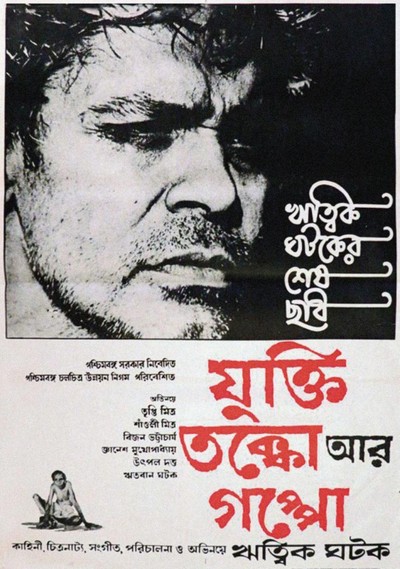Jukti, Takko aar gappo

In this last film Ritwik Ghatak himself plays Nilkantha Bagchi, an alcoholic, in the character's own words «a broken intellectual». His wife leaves him taking away his books and records which were his only properties left. When Bagchi insisted she shouldn't, Durga replied that she is taking this away so that his son grows up with these books and music, but he managed to keep a fan which he sells to buy country liquor to start his unusual and abstract ride. His first companion was Naciketa, then a woman who is homeless comes to his house just when he was about to leave, she was Bongobala, a woman who has lost her homeland Bangladesh and Bagchi describes him as the spirit of Bangladesh, who was driven away from Bangladesh. He then comes across a band of artists at a remote place drinking where they discuss art, he meets Satyajit Basu, his friend who offers him Scotch to drink, which he refuses, he asks for money to which Satyajit agrees at once and gives him a bunch of notes of which he took only one and then he said "Think Think practice thinking".
Festivals & awards
National Film Awards, India 1974
Silver Lotus Award - Best Story





Credits
Would you like to show this movie?
Please fill out our form.
Feel free to contact us
Press voices
«Der schonungsloseste Epitaph der Filmgeschichte, selbstverfasst: Ritwik Ghatak, stets gepeinigt von Identitätszweifeln, die er im Alkohol ertränkte, beginnt den Film, der sein letzter werden sollte, noch vor Titash Ekti Nadir Naam. Wie dort werden die Dreharbeiten immer wieder unterbrochen, wegen akut auftretender Tuberkulose und Alkoholdelirium. Ghatak selbst spielt einen alkoholkranken Intellektuellen, den seine Frau nach einem (autobiographischen) Wortwechsel verlässt, und der mit zwei Bürgerkriegsflüchtlingen aus Bangladesh eine Odyssee durchs zerfallene Westbengalen unternimmt. Halb Narr, halb Weiser, trifft er, zumeist betrunken, auf ehemalige Mitstreiter, die der Dekadenz anheimgefallen sind, wohnt einem traditionellen Chau-Tanz bei und findet nach einer langen, fruchtlosen Diskussion mit jungen Widerstandskämpfern durch eine zufällige Kugel den Tod, wobei er seine letzte Flasche ins Kameraobjektiv verschüttet. Inhaltlich wie stilistisch ein Film der Ratlosigkeit, die aber mit solcher Leidenschaft vorgetragen wird, dass sie zielstrebig scheint: «Das Universum brennt. Ich brenne.»
Movimiento
«C'est un film d'arguments, l'élément-histoire étant accidentel... ceux qui sont intéressés par le cinéma visuel le trouveront effroyablement ennuyeux. C'est un film de conversation et j'ai essayé de ne pas permettre au romantisme d'être le seul élément créatif. C'est une attaque contre moi-même et ceux qui font aussi partie de cette vie.»
Ritwik Ghatak



